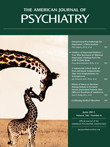Interpersonal Psychotherapy for Depression: A Meta-Analysis
Abstract
Objective:
Interpersonal psychotherapy (IPT), a structured and time-limited therapy, has been studied in many controlled trials. Numerous practice guidelines have recommended IPT as a treatment of choice for unipolar depressive disorders. The authors conducted a meta-analysis to integrate research on the effects of IPT.
Method:
The authors searched bibliographical databases for randomized controlled trials comparing IPT with no treatment, usual care, other psychological treatments, and pharmacotherapy as well as studies comparing combination treatment using pharmacotherapy and IPT. Maintenance studies were also included.
Results:
Thirty-eight studies including 4,356 patients met all inclusion criteria. The overall effect size (Cohen's d) of the 16 studies that compared IPT and a control group was 0.63 (95% confidence interval [CI]=0.36 to 0.90), corresponding to a number needed to treat of 2.91. Ten studies comparing IPT and other psychological treatments showed a nonsignificant differential effect size of 0.04 (95% CI=–0.14 to 0.21; number needed to treat=45.45) favoring IPT. Pharmacotherapy (after removal of one outlier) was more effective than IPT (d=–0.19, 95% CI=–0.38 to –0.01; number needed to treat=9.43), and combination treatment was not more effective than IPT alone, although the paucity of studies precluded drawing definite conclusions. Combination maintenance treatment with pharmacotherapy and IPT was more effective in preventing relapse than pharmacotherapy alone (odds ratio=0.37; 95% CI=0.19 to 0.73; number needed to treat=7.63).
Conclusions:
There is no doubt that IPT efficaciously treats depression, both as an independent treatment and in combination with pharmacotherapy. IPT deserves its place in treatment guidelines as one of the most empirically validated treatments for depression.



